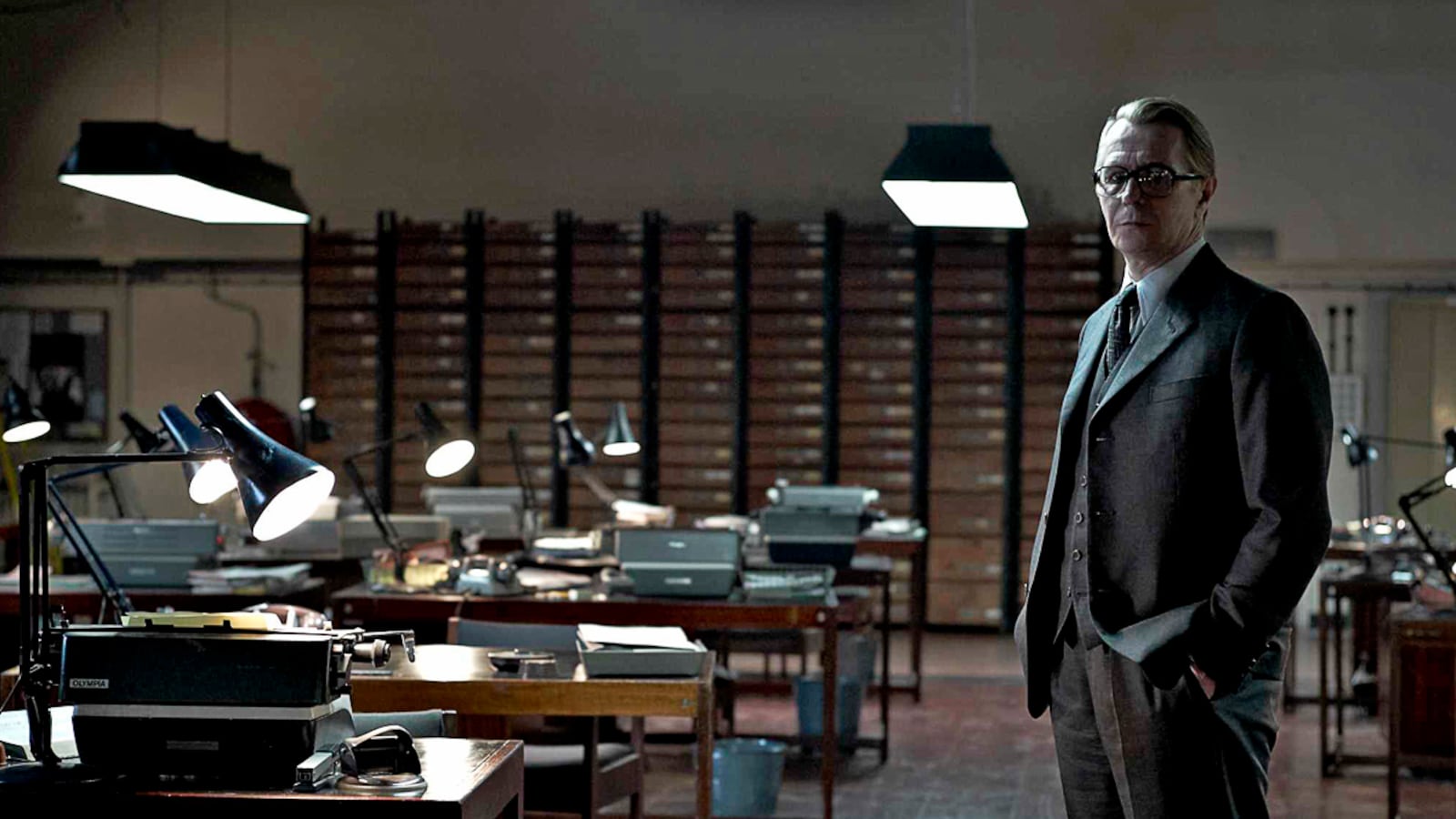The new movie version of Tinker Tailor Soldier Spy is as good as cinema gets: subtle, taut, intelligent, gripping. The normally jaded audience at the theater where I watched on the Upper West Side of Manhattan burst into unaccustomed applause at the end. Because the book was written by the now obsessively anti-American John le Carré, it had the inevitable despicable moral equivalency one has come to expect from his work (more on that later), but stylistically, the film could hardly be bettered.
The performances from Gary Oldman as George Smiley (easily as profound as Alec Guinness in the 1979 version), John Hurt, Colin Firth, Mark Strong, Ciarán Hinds, Toby Hinds, and the other Secret Intelligence Service (MI6) agents are superbly restrained and occasionally sinister, and the early Seventies are recaptured in all their rainy-day Establishment drabness, down to the bowler hats, telex machines, and brown flock wallpaper.
And there there’s the spytalk; we return to the familiarly murky world of “the Circus,” “Moscow Central,” the Soviet spymaster Karla, and the CIA “cousins.” I once asked a senior member of MI6 whether they really used words like “mole,” “safe house,” “reptile fund,” “dead-letter drop,” and so on. “Nobody did before The Spy Who Came in From the Cold,” he told me, “but after that, we all started speaking like that.” It was the ultimate case of life imitating art, especially since le Carré had spent a few years in MI6 before becoming a novelist. (Considering that Ian Fleming and Graham Greene also saw service in British Intelligence, one wonders whether it wasn’t as much a school for literary fiction as an intelligence agency.)
It’s only when le Carré moves from office politics to world politics that his moral compass goes completely haywire, when his insistence on having moral complexity in his work morphs into an attempt to portray western democracy as being as morally compromised as Soviet Communism. There is little hint of this warping of common sense and decent values in The Spy Who Came in From the Cold, or in his superb memoir of his convicted conman father, A Perfect Spy, but it appears in most of his books since. As it emerges on at least three occasions in Tinker Tailor, which will undoubtedly be an Oscar-laden movie, it should be addressed.

Not present in the original book, but all too present in the film, is a line Smiley says about Karla: “The Americans have had him tortured … No fingernails.” Yet there was no occasion during the Cold War in which the American intelligence service pulled any fingernails out of a KGB officer, let alone all of them. Smiley then says to Karla: “We’re not so different, you and me. We’ve both spent our lives looking for the weaknesses in one another’s systems. Don’t you think it’s time to recognize there is as little worth on your side as there is on mine?” This repulsive statement attempts to argue that the democratic West in the Cold War, with all its faults but with its free press and representative institutions and rule of law, was in some way the moral equivalent of the totalitarian USSR, with its gulags, censorship, satellite slave-states and its cowed and oppressed populace.
On another occasion the mole—whose name of course I won’t reveal—tells Smiley, “I had to pick a side, George. It was an aesthetic choice as much as a moral one. The West has grown so very ugly, don’t you think?” Instead of taking the opportunity to defend the values for which he has fought all his life, Smiley merely goes quiet and then changes the subject. Sir Maurice Oldfield, the patriotic British agent on whom Smiley was based, would have let the traitor know exactly what he thought of his “aesthetic” decision. Elsewhere, one of the major characters bemoans the Second World War as “a real war; Englishmen could be proud then,” as though they couldn’t be proud of protecting Britain from Stalinism and Soviet expansionism in the Cold War.
In 2003, le Carré wrote of the Iraq War, “America has entered one of its periods of historical madness, and this is the worst I can remember: worse than McCarthyism, worse than the Bay of Pigs, and in the long term potentially more disastrous than the Vietnam War.” It was typical of the many rants he has written against America—not just the Bush administration—online and in books over the years. Unfortunately this complete lack of historical perspective and judgment regarding “the cousins” has been allowed to infect the screenplay of this, perhaps the greatest of all the Cold War thrillers. What was intended to seem like “moral complexity” is left looking instead like utter moral vacuity. George Smiley deserves better.






